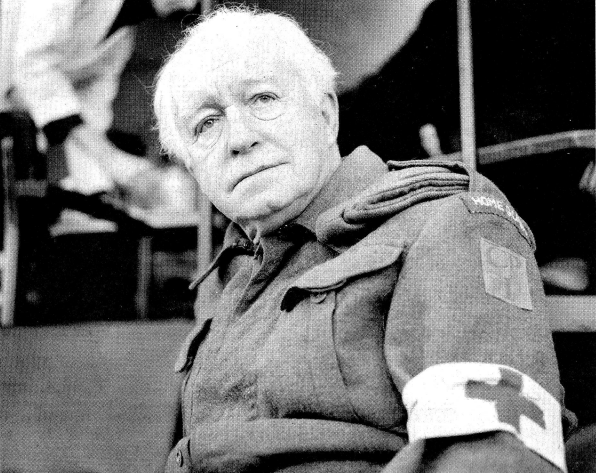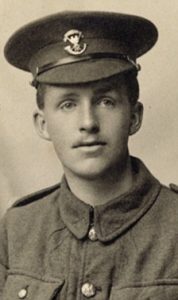My last two articles have been about ideas on keeping our good deeds between ourselves and God; not having to be accountable to others about our good deeds or our motivations; about the judgmentalism of others; and about the depth of the true motivations behind our actions.
Rarely, though, in these times of online presence and social media, do we really have to pay the penalty for our silence and our refusal to be judged by others. Usually, we can simply hit the ‘Block’ button, and that’s the end of it. But in times past, in fact even up until very recent times, it wasn’t like that, because most interactions were face-to-face and so there was often no escape.
Today, I would like to give what is for me a deeply moving real-life example of a person who modestly chose to conceal his true self, his personal convictions and his motivations from his critics. He did this at the expense of being unjustly labelled as a coward in what was, at the time, the most humiliating way possible. And this despite his being one of the bravest men I have ever read about.
His name was Arnold Ridley.
Many of my readers (especially ones of my age or older!) will remember the legendary 1960s/70s wartime sitcom ‘Dad’s Army’. And so you’ll also remember Arnold as the actor who played the lovable old duffer ‘Private Godfrey’. Yep, that’s the same Arnold Ridley.

In one episode of Dad’s Army, ‘Branded‘, Godfrey declares that he wishes to resign from the Home Guard platoon because he realises that he could never bring himself to kill another person. He also reveals that he had been a Conscientious Objector (that is, someone who refused to fight for reasons of conscience) during the First World War, and because of this he is ostracised by some of the other members of the platoon. This is because Conscientious Objectors were thought to be ‘cowards’ by the rest of society, and so the platoon treat him as one; he is therefore effectively given the ‘white feather’ – the symbol of cowardice – by his platoon mates. Of course, some Conscientious Objectors may well have been ‘cowards’, but many if not most were simply people of high principles who stood firm on their personal beliefs, despite incredible outward pressure to conform. That takes courage at a level not often found in your average ‘coward’ 😉
Later in the episode, and at the risk of his own life, Godfrey bravely rescues his Commanding Officer, Captain Mainwaring, from being suffocated in a smoke-filled hut, and so the platoon visit Godfrey as he is recuperating in his bed at home.
Above the bed is a photo of Godfrey in uniform, and Capt. Mainwaring notices that, in the photo, Godfrey is wearing the Military Medal, a decoration for bravery in battle on land. Godfrey’s sister reveals that, during the First World War, he had volunteered to join the Medical Corps, and that he’d served as an unarmed stretcher bearer at the Battle of the Somme, and had recovered wounded men from no-man’s land under heavy fire. He tries to downplay the story and make light of his heroism, but his sister insists on telling his platoon mates the story as it was. He felt that wearing the medal would have ‘seemed rather ostentatious’ and so no-one ever knew about his courage*. ‘It does show, sir, that you can’t always go by appearances…’ are his words that close the episode.
That was Pvt Godfrey’s story.
What many don’t know is the very similar story of the man who played Godfrey, our aforementioned Arnold Ridley himself.
 Arnold volunteered for the British Army on the outbreak of World War I in 1914, at the age of sixteen. Although, for medical reasons, he was not at first accepted, the following year he volunteered again and this time he was accepted.
Arnold volunteered for the British Army on the outbreak of World War I in 1914, at the age of sixteen. Although, for medical reasons, he was not at first accepted, the following year he volunteered again and this time he was accepted.
He joined the Somerset Light Infantry, and fought at the Battle of the Somme in 1916. During the battle, he was severely wounded in the legs, head, back, groin and hand; he also suffered from severe shell-shock, and it is unsurprising that he was invalided home with a medical discharge.
Back in England, while out and about one day, Arnold was given a white feather – actually given a real, physical white feather – by a woman in the street who was obviously judging him for not being on the Western Front (or any other front for that matter) and participating in the fighting. He took the feather without comment, later explaining that, “I wasn’t wearing my soldier’s discharge badge. I didn’t want to advertise the fact I was a wounded soldier and I used to carry it in my pocket”. Not once did he try to justify himself, explain himself, or counter that woman’s action in any way.
My goodness. Words can’t describe that kind of courage.
And later, as if that wasn’t enough, when the Second World War began, Arnold selflessly volunteered again, and went to France in 1939 as part of the British Expeditionary Force (BEF). I understand that Arnold almost immediately began to suffer a relapse of his shell-shock, and that if anything his experiences in France in 1939-40 were worse than those at the Somme. He was evacuated on the last ship out of Boulogne in May, 1940, having seen the catastrophic collapse of the BEF as the Nazis’ Blitzkrieg swept across France. He was demobilised from the Army on his return; however, he joined the (real!) Home Guard and also ENSA,** in which he helped to entertain the troops.
Do I really need to comment? People often ask if our modern soldiers would have the same sense of duty, modesty, honour and all those other things so characteristic of that generation; I would assume that they would, of course, but that’s not what I’m writing about today.
I’d say my main point is that it takes huge courage to not try to defend oneself against unjustified criticism. Courage that, in Arnold’s case, he’d already shown he had, and then some. Here is a very brave man who was thought to be a coward, but was actually a courageous war hero who just happened to be so modest that he didn’t let anyone know about his heroism.
It demonstrates very strongly to me that no-one has any right what. so. ever. to judge someone else. Especially to judge them for what actions the person judges them as having, or not having, carried out to the judger’s satisfaction. Arnold is a case in point; he was willing to suffer others’ negative judgments because he didn’t want to ‘blow his own trumpet; that sort of thing just wasn’t done back then. But at the same time he also had his own inner security of knowing what he really was. He preferred for his heroism to remain anonymous even at the price of being given the white feather. Now that’s real heroism.
What is is with humans judging each other all. the. time? It seems, as I said in my previous essay, that some people exist only to judge others. Well, no-one has the right to judge anyone, under any guise whatsoever. In my previous posts, I’ve been through the theology; this time it’s all about reasonable, decent standards of behaviour and common sense 😀
So, I’m going to adopt the practice of not doing my judges the honour of responding to their judgmentalism and criticism. I have only a set number of heartbeats to spend on this earth; buggered if I’m going to waste them on people who really have neither a clue, nor the right, to impose on the ‘real me’ their own impressions of what they think I am. And you too can choose to adopt that point of view, should you so wish.
No, I’m going to follow the example of the amazing Arnold Ridley, and not even answer my critics. Not out of pride, you understand, but just that nothing of my life is any of their business, and I am secure in who I am, because I know myself 😀
But what a brave guy Arnold Ridley was. You’d never have guessed it, would you? And you know what, I am absolutely sure that that is exactly the way he would have wanted it.
Grace and Peace to you
*Courage, to me, means being absolutely terrified about doing something, but going ahead and doing it anyway.
**Entertainments National Service Association, an organisation that provided entertainment for British armed forces personnel in World War II.
Useful Links
(All links will open in new tabs/windows)
Arnold Ridley’s page on Wikipedia
Arnold Ridley’s page on IMDB (Internet Movie Database)
Article about Arnold Ridley in the Daily Mail, featuring an interview with his son, Nicholas. Some of the things I have written in this piece as facts were researched from that article, which is why I have written above that ‘I understand that…’ because the only thing I really trust about the Daily Mail is the date on the front 😉
Some of the material in this piece was gleaned from an article published in the Herald Express, February 12th 2020, written by Guy Henderson, and used here with his kind permission.
